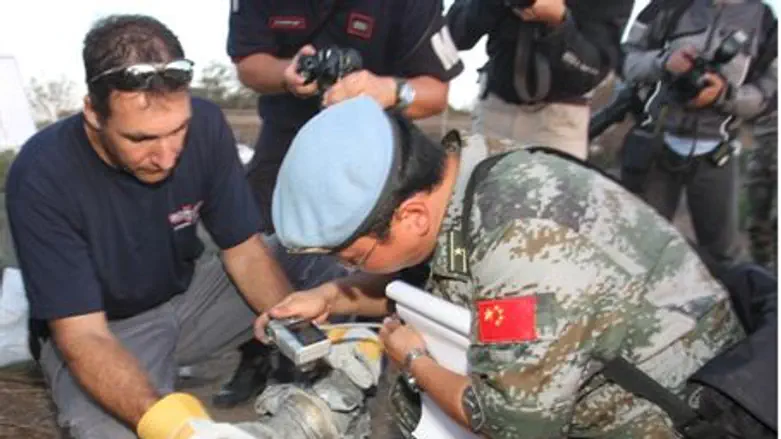
The number of Lebanese troops in the southern border district, near Israel, has been decreasing and leading to an increase in standoffs between UNIFIL and suspected members of Hizbullah, the Lebanese Daily Star reported on Wednesday.
According to the report, UNIFIL patrols are finding paths blocked and former temporary observation points suddenly out of bounds in what is being interpreted as Hizbullah seeking to flex its muscles on the ground.
UNIFIL officers are privately expressing frustration at the often humiliating confrontations with Hizbullah members, in which the peacekeepers feel compelled to back down.
One officer noted that UN Security Council Resolution 1701 calls on the Lebanese Army to take control of the southern border district, with UNIFIL playing a support role.
“The Lebanese Army is nowhere near that right now. In fact, they are further away from that than before,” the officer said, according to the Daily Star.
With units withdrawn in response to deteriorating security situations in Tripoli, Sidon and the north, the Lebanese Army troop strength has dwindled to an estimated 3,000 soldiers in the border district, various UNIFIL sources said.
Only around 10 percent of the peacekeepers’ patrols are conducted jointly with Lebanese troops. The absence of Lebanese soldiers as interlocutors leaves UNIFIL patrols more vulnerable to intimidation by Hizbullah or local residents.
In one of several examples given to the Daily Star, on February 9, a motorized patrol of Belgian peacekeepers drove down a track to inspect the border fence near Mais al-Jabal. As the peacekeepers approached the fence, they saw a civilian vehicle coming the opposite way with five men inside, one of them in military uniform.
The Belgians stopped the car and one of the peacekeepers attempted to snap a picture of its occupants. Four of the five men jumped out of the car and snatched the camera along with the keys to the Belgians’ vehicle. The Belgians cocked their rifles and one of the Lebanese men put his hand inside his jacket as if to reach for a pistol.
Another of the four men quickly interceded and explained they did not want any trouble. The four men returned to the car and drove away, taking with them the camera and the vehicle keys, leaving the Belgians stranded. Moments later, the car reversed back down the track and the keys were tossed out of the window for the Belgians to collect.
Incidents of friction between local residents and UNIFIL peacekeepers are not unusual although the recent confrontations with men clearly belonging to Hizbullah are less common, the report said.
According to the report, a conclusion to be drawn from the activities in the southern border district is that, despite the media attention lately on Hizbullah’s role in Syria, the terror group has not taken its eye off the ball in terms of the confrontation with Israel. In fact, the bulk of Hizbullah’s fighting force is looking south toward Israel, not east and north into Syria, reported the Daily Star.
Last week an unmanned aerial vehicle (UAV) penetrated Israeli air space from Lebanon.
The UAV was shot down by Israel about eight kilometers off the coast of Haifa.
Hizbullah was fingered as being behind the incident, but the terror group denied “sending any unmanned drone towards occupied Palestine.” A Lebanese security official has also denied that the drone had been sent from Lebanon.
Hizbullah sent a UAV into Israeli territory in October. The IAF shot it down when it was well within Israeli territory, over Judea.
On Sunday, the IDF launched a sudden major drill in northern Israel. The exercise began with an emergency call-up, and will conclude at the end of the week.
Roughly 2,000 reservists were called up suddenly to take part in the drill.
The exercise was created due to recent threats from Israel’s northern neighbors, Lebanon and Syria.
